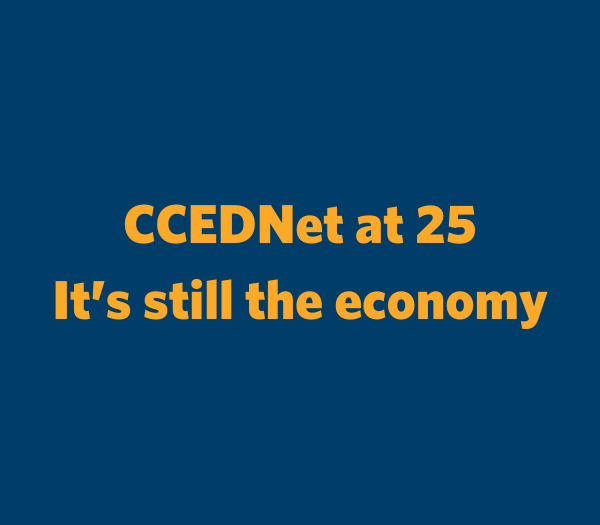Times change!
When CCEDNet was incorporated in 1999, the internet was still in its early days. Most social media platforms we use today didn’t exist. Pandemics and polarization were far away things. People of my age and older might remember wondering if Y2K would break all the computers.
Also in 1999, CED was all the rage. There were CED training institutes across Canada, the McConnell Foundation had committed what would become $10M to the CED Technical Assistance Program at Carleton University, academics were doing research and universities creating educational programs, the Conference Board of Canada had a working group, cities had CED networks, provinces had CED secretariats… the list goes on.
Those days have passed. But the need for CED has not. Inequality, poverty, the growing cost of housing and food, the climate crisis and environmental destruction persist or are worsening. Why?
It’s the economy.
What determines the jobs available, how much money you make (which is a key determinant of your health and wellbeing), what choices you have to spend money, or invest if you’re lucky to have enough to invest?
It’s the economy.
We still urgently need economic change.
It’s worth remembering that the emergence of CED was just the latest articulation of efforts towards economic justice that stretch back a very long time. The values and principles that are at the heart of CED – democratic, community care and control of the economy, concern for equity and inclusion, dignity and self-determination – are perennial, and have also found expression in the co-op movement, Indigenous practices, the Black solidarity economy, the social economy, the Antigonish movement, the labour movement, and many others.
So if we look at that long arc of strategies, what are the movements that have momentum now? There are lots. We asked members about them in our annual survey this year, and the ones that were most often used or elicited the most interest (besides CED) were Social Innovation and Social Finance, Community Wealth Building, the Social and Solidarity Economy (which was recently recommended by the OECD, UN and ILO), Well-Being Economies, Indigenomics and Doughnut Economics.
Just as CED was a strategic opportunity in 1999, in 2024 it remains our job to find the frames that resonate now and will allow us to continue shifting power and practices to the perennial values and life-affirming economic systems we need.
Because it’s still the economy.
But here’s something that will never go out of style: organizing for economic justice. The involvement of members like you and many others has made CCEDNet what it is today. Let’s continue to make it an even more powerful force for change.





